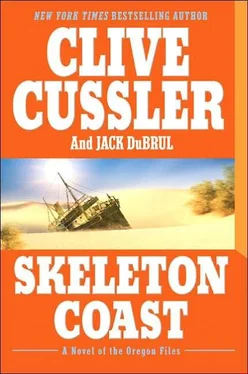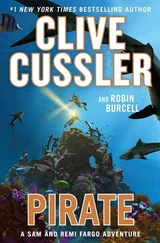Juan made his decision quickly. “Get Murph and Linda Ross working on this.” With her background in Naval Intelligence, Ross was the perfect choice to spearhead the research and Murph was the best at finding obscure patterns in an avalanche of information. “Tell them I want to know exactly what’s going on. Who took Merrick? Who’s in charge of the investigation? What and where is the Devil’s Oasis? The works. Plus background on Merrick/Singer.”
“What’s our interest in him?”
“Altruism,” Cabrillo said with a piratical smirk.
“Nothing to do with the fact he’s a billionaire, huh?”
“I’m shocked you’d think that of me,” Juan said with convincing indignation. “His wealth never left my mind—I mean, entered it.”
6
JUANCabrillo sat behind his desk, his feet propped up on the inlaid wood, as he read Eddie’s and Linc’s after-action reports off his tablet PC. Despite what had to have been a hair-raising series of events, both men made the material dull, exhorting their partner’s contribution to the mission over their own and downplaying the dangers until it almost read like stereo instructions. He jotted a couple of notes using a light pen and sent the electronic reports to the computer’s archive.
He then checked the weather services. The ninth major Atlantic storm of the year was forming to their north and while it wasn’t a threat to theOregon , he was interested because so far three storms had become hurricanes and the season was only a month old. Forecasters were predicting that this year would rival or even top the number of named storms that slammed the United States in 2005, destroying New Orleans and severely damaging Texas’s Gulf Coast. The experts claimed that this was part of a normal cycle of hurricane severity and frequency; however, environmental groups were clamoring that the superstorms were the result of global warming. Juan put his stock with the forecasters, but the trend was troubling.
The weather along Africa’s southwestern coast looked clear for at least the next five days.
Unlike his disheveled appearance playing at a greedy officer aboard a tramp steamer the night before, the morning found Cabrillo freshly showered and wearing a pair of English-cut blue jeans, a Turnbull and Asser shirt open at the throat, and a pair of deck shoes without socks. Because people would see his ankles, he had donned a prosthetic right leg covered in flesh-toned rubber, rather than one of his more mechanical-looking limbs. He kept his hair short, just longer than a crew cut, and despite his Latino name and heritage, his hair was bleached almost white by a California upbringing spent mostly in the sun and surf.
The armored porthole covers had been lowered so his cabin was bathed in natural light. The teak wainscoting, floors, and coffered ceiling gleamed with a fresh coat of polish. From his desk he could see through to his bedroom, which was dominated by a massive hand-carved four-poster, and beyond to the head, with its Mexican tile shower stall and copper Jacuzzi tub and sink basin. The rooms had the masculine smell of Juan’s aftershave and the occasional La Troya Universales Cuban cigars he enjoyed.
The décor was simple and elegant, and showed Juan’s eclectic tastes. On one wall was a painting of the Oregon plowing through an angry sea while another had glass-fronted shelves for some of the curios he had picked up from his travels, a clay figurine of an Egyptianushabti , a stone bowl from the Aztec Empire, a prayer wheel from Tibet, a piece of scrimshaw, a Ghurka knife, a doll made of seal fur from Greenland, a piece of raw emerald from Columbia, and dozens of other items. The furniture was mostly dark and the lighting was discreet and recessed, while the throw rugs on the floor were silk Persians in bright colors.
The one telling thing in the room was the lack of photographs. Where most men at sea had pictures of their wives and children, there were no such snapshots in Juan’s cabin. He had been married, but her fatal drunk driving accident eleven years ago was a pain Juan had tucked deep inside and refused to acknowledge.
He took a sip of rich Kona coffee, noted the service set, and smiled.
Two of the things that enabled him to recruit and keep some of the best from America’s armed forces and intelligence services were he paid well and spared no expense on his crew, be it pricey china in the mess hall and Le Cordon Bleu–trained chefs in the galley or the decorating allowance he gave each new team member to redo their private cabins. Mark Murphy had used up most of his budget on a sound system that could shake barnacles off the hull. Linda Ross had engaged a New York City decorator in her cabin, while Linc’s was as Spartan as a Navy barracks—the money instead going toward the Harley-Davidson he kept in the hold.
TheOregon sported a large fitness facility with saunas, and when not on an assignment one of her ballast wants could be half filled and turned into an Olympic-length swimming pool. The men and women of the Corporation lived well, but as exemplified in this most recent mission, they also lived dangerously. Every member of the crew was a stockholder and while the officers enjoyed the lion’s share of the profits, Juan’s favorite task at the end of an operation was signing bonus checks for the technicians and auxiliary personnel. That would total some $500,000 for the job they’d just pulled off.
He was just about to start typing his report to Langston Overholt, his old friend at the CIA who brought the Corporation a great deal of business, when someone knocked on his door.
“Come.”
Linda Ross and Mark Murphy stepped into his cabin. Where Linda was perky and petite, Murph was gangly and awkward with shaggy dark hair, a goatee that a single swipe with a razor would erase, and a habit of wearing nothing but black. One of the few on the ship without a military background, Mark was a certified genius who had earned his Ph.D. by the time he was twenty. He’d gone into R&D for a defense contractor where he’d met Eric Stone, who was in the Navy then, but a short-timer with a contract to come and work for Juan. Eric had convinced Cabrillo that the young weapons expert would be a perfect fit for the Corporation, and in the three years since, and despite Murph’s taste for punk music and how he would turn the ship’s deck into a skateboard park, Juan couldn’t have agreed more.
Cabrillo glanced at the antique chronograph across from his desk. “Either you two completely struck out or you hit a home run to get back to me this quickly.”
“Let’s say we’re on third,” Murph said, adjusting the bundle of papers in his arms. “And for the record I don’t like sports metaphors because I don’t get them half the time.”
“So this was a slam dunk more than a Hail Mary.” Juan grinned.
“If you say so.”
They took seats opposite Juan who cleared a bunch of papers off his desk. “Okay, what do you have?”
“Where do you want to start?” Linda asked. “The kidnapping or the company?”
“Let’s start with the background first so I know who we’re dealing with.” Juan laced his fingers behind his head and stared at the ceiling while Linda began her report. It might have been rude not to look her in the eye but it was one of his quirks when concentrating.
“Geoffrey Merrick, age fifty-one. Divorced with two grown children, both of whom spend their time blowing through their father’s money by chasing paparazzi so they can end up in tabloids. The wife is an artist living in New Mexico and keeps a low profile.
“Merrick graduated with a Ph.D. in Chemistry from MIT exactly one day younger than Mark was when he received his, and partnered up with another alum, Daniel Singer, to form Merrick/Singer, a materials research company. The firm has applied for and received eighty patents in the past twenty-five-odd years and the company has grown from the two of them in a rented space outside Boston to a campus near Geneva, Switzerland, with a staff of a hundred and sixty.
Читать дальше












